Sharpeville - Study guides, Study notes & Summaries
Looking for the best study guides, study notes and summaries about Sharpeville? On this page you'll find 21 study documents about Sharpeville.
All 21 results
Sort by
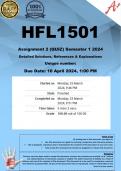
-
HFL1501 Assignment 2 (COMPLETE ANSWERS) Semester 1 2024 - DUE 10 April 2024
- Exam (elaborations) • 11 pages • 2024
-
- R50,00
- 19x sold
- + learn more
HFL1501 Assignment 2 (COMPLETE ANSWERS) Semester 1 2024 - DUE 10 April 2024 ;100% TRUSTED workings, explanations and solutions. for assistance Whats-App.......0.6.7..1.7.1..1.7.3.9.......... Question 1 Not yet answered Marked out of 1.00 QUIZ In which case did the court state that although the indigenous African law principle of ubuntu-botho and the Roman-Dutchlegal remedy of amende honorable “are expressed in different languages intrinsic to separate legal cultures, they [both] share...
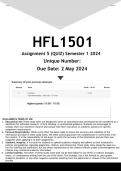
-
HFL1501 Assignment 5 (ANSWERS) Semester 1 2024 - DISTINCTION GUARANTEED
- Exam (elaborations) • 75 pages • 2024 Popular
-
- R50,00
- 4x sold
- + learn more
Well-structured HFL1501 Assignment 5 (ANSWERS) Semester 1 2024 - DISTINCTION GUARANTEED. (DETAILED ANSWERS - DISTINCTION GUARANTEED!). . Question 1 Not yet answered Marked out of 1.00 QUIZ Identify whether the following statement is true or false : In terms of Roman legal principles, theft qualifi ed as a crime. Select one: True False Time left 1:49:29 UNISA 2024 HFL1501-24-S1 Assessment 5 Question 2 Not yet answered Marked out of 1.00 QUIZ Consider the case o...
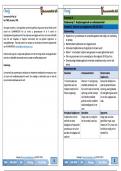
-
Graad 9 Sosiale Wetenskappe (SW) (Geografie en Geskiedenis) Kwartaal 4 (Via Afrika) Opsommings
- Summary • 21 pages • 2024
-
- R177,61
- + learn more
Hierdie produk bevat al die werk vir Sosiale Wetenskappe Graad 9, kwartaal 4 en is gebaseer op die “Via Afrika” Handboek in Afrikaans. Geografie: Hulpbrongebruik en volhoubaarheid: Eenheid 1: Gebruik van hulpbronne. Eenheid 2: Volhoubare gebruik van hulpbronne. Eenheid 3: Voedselhulpbronne. Geskiedenis: Keerpunte in die Suid-Afrikaanse geskiedenis: 1960, 1976 en 1990: Eenheid 1: 1960: Die Sharpeville-slagting en die Langa-optog. Eenheid 2: 1976: Die Soweto-opstan...
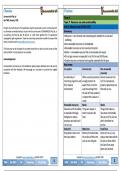
-
Grade 9 Social Sciences (SS) (Geography & History) Term 4 (Via Africa) Summaries
- Summary • 21 pages • 2024
-
- R177,61
- + learn more
This product contains all the work for Social Sciences (Geography & History) Grade 9, term 4 – based on the “Via Africa” textbook in English. Geography – Resource use and sustainability Unit 1: Resource use Unit 2: Sustainable use of resources Unit 3: Food resources History – Turning points in South African history 1960, 1976 and 1990 Unit 1: 1960: Sharpeville Massacre and Langa March Unit 2: 1976: Soweto Uprising Unit 3: 1990: Release of Nelson Mandela and the unbannin...
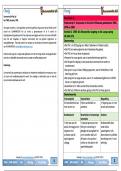
-
Graad 9 Sosiale Wetenskappe (SW) (Geografie en Geskiedenis) Kwartaal 4 (Via Afrika) Opsommings
- Summary • 18 pages • 2024
-
- R177,61
- + learn more
Hierdie produk bevat al die werk vir Sosiale Wetenskappe Graad 9, kwartaal 4 en is gebaseer op die “Via Afrika” Handboek in Afrikaans. Geografie: Hulpbrongebruik en volhoubaarheid: Eenheid 1: Gebruik van hulpbronne. Eenheid 2: Volhoubare gebruik van hulpbronne. Eenheid 3: Voedselhulpbronne. Geskiedenis: Keerpunte in die Suid-Afrikaanse geskiedenis: 1960, 1976 en 1990: Eenheid 1: 1960: Die Sharpeville-slagting en die Langa-optog. Eenheid 2: 1976: Die Soweto-opstan...
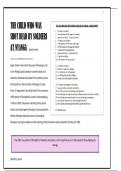
-
THE CHILD WHO WAS SHOT DEAD BY SOLDIERS AT NYANGA by Ingrid Jonker
- Summary • 9 pages • 2024
-
- R70,00
- + learn more
THE CHILD WHO WAS SHOT DEAD BY SOLDIERS AT NYANGA by Ingrid Jonker Ingrid Jonker had written the poem following a visit to the Philippi police station to see the body of a child who had been shot dead in his mother’s arms by the police in the township of Nyanga in Cape Town. It happened in the aftermath of the massacre of 69 people in Sharpeville, south of Johannesburg, in March 1960. They were marching to the police station to protest against having to carry passbooks. Nelson Mandel...
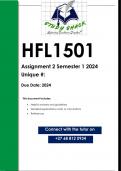
-
HFL1501 Assignment 2 (QUALITY ANSWERS) Semester 1 2024
- Exam (elaborations) • 11 pages • 2024
-
- R50,00
- + learn more
This document contains workings, explanations and solutions to the HFL1501 Assignment 2 (QUALITY ANSWERS) Semester 1 2024. For assistance call or us on 0.6.8..8.1.2..0.9.3.4...... Question 1 Not yet answered Marked out of 1.00 QUIZ In which case did the court state that although the indigenous African law principle of ubuntu-botho and the Roman-Dutchlegal remedy of amende honorable “are expressed in different languages intrinsic to separate legal cultures, they [both] sharethe same un...
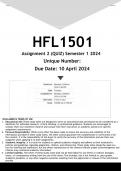
-
HFL1501 Assignment 2 (ANSWERS) 2023 - DISTINCTION GUARANTEED
- Exam (elaborations) • 11 pages • 2024
-
- R50,00
- + learn more
Well-structured HFL1501 Assignment 2 (ANSWERS) 2023 - DISTINCTION GUARANTEED . (DETAILED ANSWERS - DISTINCTION GUARANTEED!). Question 1 Not yet answered Marked out of 1.00 QUIZ In which case did the court state that although the indigenous African law principle of ubuntu-botho and the Roman-Dutchlegal remedy of amende honorable “are expressed in different languages intrinsic to separate legal cultures, they [both] sharethe same underlying philosophy and goal”? S v Makwanyane Dik...
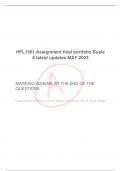
-
2024 LATEST Historical Foundations of South African Law (HFL1501) PORTFOLIO EXAMINATION
- Exam (elaborations) • 14 pages • 2024
-
- R213,86
- + learn more
QUESTION 1 1. The practical reception: the reception of the actual rule (the content) of a legal system. E.g. English Companies Act, which was adopted in its entirely applied here in south Africa 2. Scientific reception: the reception of the scientific system of a legal system precisely, the reception of the concepts, categories, principles and divisions (the structure) of a legal system. E.g. the distinction between public and private law QUESTION 2 2.1 Indigenous law- It may be a syste...
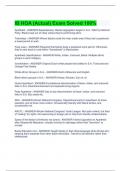
-
IB HOA (Actual) Exam Solved 100%
- Exam (elaborations) • 8 pages • 2023
- Available in package deal
-
- R204,56
- + learn more
Apartheid - ANSWER-Separateness. Racial segregation began in S.A. 1948 by National Party. Blacks kept out of cities unless they're performing labor. Townships - ANSWER-Where blacks could live near urban area if they had a passbook; a taxed permit to work. Pass Laws - ANSWER-Required that blacks keep a passbook work permit. Otherwise, they're sent back to rural ethnic "homelands" or Bantustans. Apartheid classifications - ANSWER-White, Indian, Coloured, Black. Multiple ethnic groups ...

R115 for your summary multiplied by 100 fellow students... Do the math: that's a lot of money! Don't be a thief of your own wallet and start uploading yours now. Discover all about earning on Stuvia


